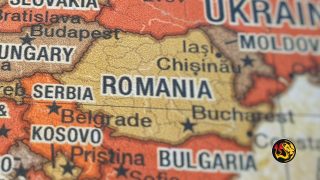
By Stefan J. Bos, Chief International Correspondent, Worthy News
BUCHAREST/BUDAPEST (Worthy News) – Romania’s pro-Russia politician Călin Georgescu confirmed Monday he had appealed against the country’s Central Electoral Bureau (BEC) decision to bar him from participating in May’s presidential election, a move that led to riots in the streets of Bucharest.
Constitutional Court judges were to meet on Tuesday afternoon local time to discuss Georgescu’s appeal, and a final ruling was expected the same day.
The BEC rejected his candidacy on Sunday after a 10-4 vote, arguing it did not “meet the conditions of legality,” as Georgescu “violated the very obligation to defend democracy.”
Last year, the court annulled November’s first round of the vote—in which Georgescu came first—after intelligence claimed that Russia was involved in 800 social media platform TikTok accounts backing him.
In his appeal, Georgescu said that the “BEC exceeded its legal powers.” He also stressed that the constitutional court’s decision on the November election should not affect his candidacy for the upcoming vote in May.
In a social media post, Georgescu called the ban a “direct blow to the heart of democracy worldwide.”
The electoral bureau’s decision sparked unrest in Bucharest on Sunday evening. Clashes broke out between police and Georgescu supporters who had gathered in their thousands outside the offices of the BEC.
VIRAL VIDEOS
Despite being relatively unknown in mainstream politics, Georgescu skyrocketed to fame through his viral TikTok videos.
He shocked Romania’s political establishment when he won last year’s ballot’s first round of voting. Still, just before the second round, the electoral commission declared the election invalid, citing the alleged Russian interference.
Moscow arguably likes Georgescu as he condemned a U.S. missile defense system based in Romania, campaigned for ending Romanian aid to Ukraine, and called for “Russian wisdom” in shaping foreign policy. He is skeptical about Romania’s membership of the NATO military alliance and the European Union.
Georgescu, 62, has also been criticized for far-right views, including calling Romania’s Jews persecuting figures Corneliu Codreanu and Ion Antonescu “national heroes.”
Codreanu was a far-right Romanian politician who led the ultranationalist and violently antisemitic Iron Guard in the 1930s while Romanian leader Antonescu facilitated the Holocaust, or Shoah, in Romania before he was tried for war crimes and executed in 1946.
Expressing public support for these and other sympathizers of the Iron Guard, a pre-World War II fascist and antisemitic movement and political party, is illegal under Romanian law.
Yet the administration of U.S. President Donald J. Trump has raised questions about banning Georgescu from elections, saying it could undermine freedom of expression.
MUSK ANGRY
Elon Musk, the famed U.S. billionaire-turned-presidential adviser, responded to a Swedish journalist’s post on the social media platform X, formerly Twitter, about Romania’s banning Georgescu from running for president, writing: “This is crazy!”
He and U.S. Vice President JD Vance previously criticized the Romanian government’s decision to cancel a re-run election.
Musk also spoke out in February when Georgescu was briefly detained by authorities, saying on X: “They just arrested the person who won the most votes in the Romanian presidential election. This is messed up.”
Georgescu has denied the charges against him, which included “anticonstitutional acts” and “misreporting” his finances. The charges also revolved around his support for sympathizers of the Iron Guard.
Georgescu’s questioning was part of a nationwide police action that involved raids against 27 individuals under investigation for crimes such as “anti-constitutional actions” and possession of “illegal weapons caches.”
Individuals were also charged with instigating racism, fascism, and xenophobia and “promoting a cult of personality accused of genocide and war crimes.”
These issues remain sensitive in Romania, which has a recent turbulent history with wars and a post-war dictatorship. In 1989, the country toppled dictator Nicolae Ceaușescu, who had run the nation with an iron fist for decades. He and his wife, Elena, were executed by firing squad on Christmas Day, 1989, following a brief and controversial trial.
Copyright 1999-2026 Worthy News. This article was originally published on Worthy News and was reproduced with permission.
Latest News from Worthy News
Senior Hamas leader Khaled Mashaal on Sunday reaffirmed the terrorist group’s refusal to disarm, rejecting demands from U.S. President Donald Trump and vowing to continue the fight against Israel.
The U.S. government added $696 billion to the national debt over the past four months, borrowing $94 billion in the month of January alone, the Congressional Budget Office reports.
Anti-ICE protests continued in Minneapolis over the weekend, resulting in dozens of arrests by local law enforcement.
Authorities across North Africa and southern Europe remained on high alert Monday after powerful storms killed numerous people and forced the evacuation of more than 160,000 residents.
Ukraine’s foreign minister has warned that intensified Russian attacks on his country’s energy infrastructure are creating a direct risk of a nuclear incident that could affect all of Europe.
Official results confirmed Monday that Socialist Party candidate António José Seguro won Portugal’s presidential election with 66.7 percent of the vote, defeating André Ventura of the right-wing nationalist Chega (“Enough”) party.
Despite what advocates describe as decades of persecution, discrimination, and insecurity, Pakistan’s Christians remain steadfast in their faith and committed to peaceful coexistence, a leading Christian rights advocate said Friday.







